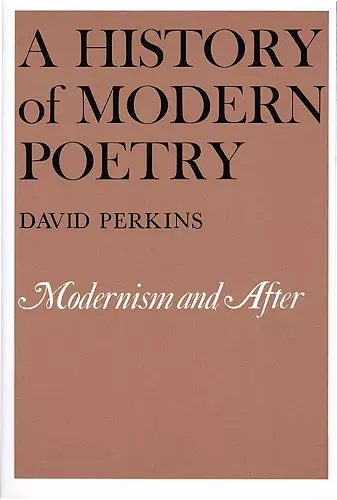A History of Modern Poetry
Format:Paperback
Publisher:Harvard University Press
Published:14th Nov '89
Currently unavailable, and unfortunately no date known when it will be back

There have been many books on early modernist poetry, not so many on its various sequels, and still fewer on the currents and cross-currents of poetry since World War II. Until now there has been no single comprehensive history of British and American poetry throughout the half century from the mid-1920s to the recent past. This David Perkins is uniquely equipped to provide; only a critic as well informed as he in the whole range of twentieth-century poetry could offer a lucid, coherent, and structured account of so diverse a body of work.
Perkins devotes major discussions to the later careers of the first Modernist poets, such as Eliot, Pound, Stevens, and Williams, and to their immediate followers in the United States, E. E. Cummings, Archibald MacLeish, and Hart Crane; to W. H. Auden, Dylan Thomas, and the period style of the 1930s; to the emergence of the New Criticism and of a poetry reflecting its tenets in William Empson, John Crowe Ransom, Allen Tate, John Berryman, and Robert Lowell, and to the reaction against this style; to postwar Great Britain from Philip Larkin and the “Movement” in the 1950s to Ted Hughes, Charles Tomlinson, and Geoffrey Hill; to the theory and style of “open form” in Charles Olson and Robert Duncan; to Allen Ginsberg and the Beat poetry of the 1960s; to the poetry of women’s experience in Sylvia Plath and Adrienne Rich; to the work of Black poets from Robert Hayden and Gwendolyn Brooks to Amiri Baraka; and to Elizabeth Bishop, W. S. Merwin, A. R. Ammons, John Ashbery, and James Merrill.
Perkins discusses some 160 poets, mentioning many others more briefly, and does not hesitate to explain, to criticize, to admire, to render judgments. He clarifies the complex interrelations of individuals, groups, and movements and the contexts in which the poets worked: not only the predecessors and contemporaries they responded to but the journals that published them, the expectations of the audience, changing premises about poetry, the writings of critics, developments in other arts, and the momentous events of political and social history. Readers seeking guidance through the maze of postwar poetry will find the second half of the book especially illuminating.
[Perkins] is generous, sympathetic, sensitive, inquisitive, and has a goodly streak of common sense. These are the virtues one hopes for in a literary historian… Clearly Perkins has a talent for getting under the skins of different styles and into the heads of people who lived in the recent past. -- Stuart Klawans * The Nation *
The scope of…inclusion is certainly impressive, with attention given to black and woman writers and to a broader range of British writing than might have been expected from an American critic: there can be few readers who will not find ways into new poetic territory from this enthusiastically written book. -- David Norbrook * London Review of Books *
The author moves deftly between text and context, offering both panorama and portrait, and the dimensions of his extremely rich study can only be suggested here… It is amazing to observe the freshness and sensitivity with which Perkins approaches each poet… His opinions are strong and expressed with authority yet modesty… A landmark study. -- Beth Bjorklund * World Literature Today *
This is clearly the most important history of 20th-century poetry to appear. It is difficult to imagine a better book. Perkins’s work will surely be the standard history by which all future assessments will have to be judged. * Choice *
ISBN: 9780674399471
Dimensions: 210mm x 140mm x 38mm
Weight: 816g
712 pages